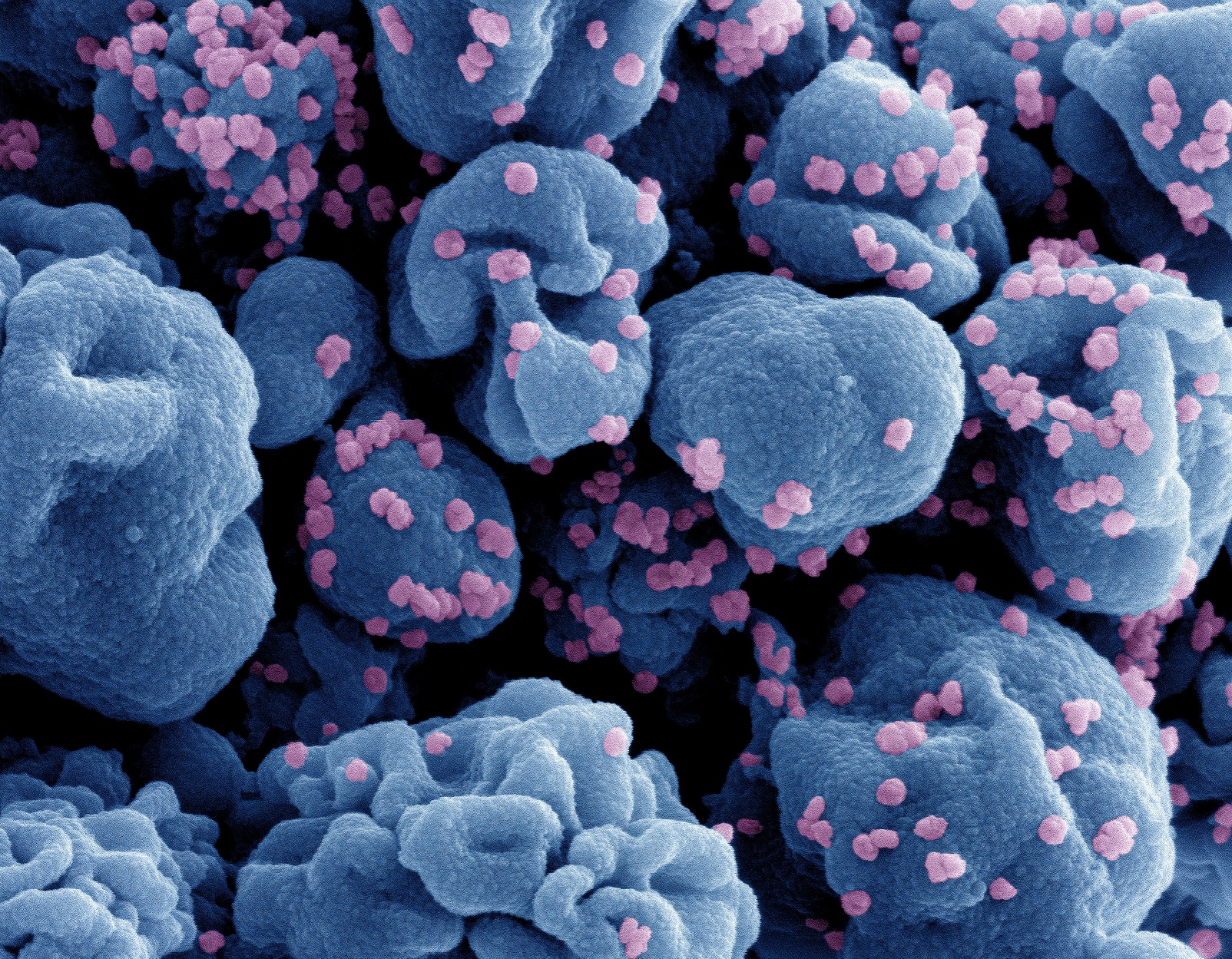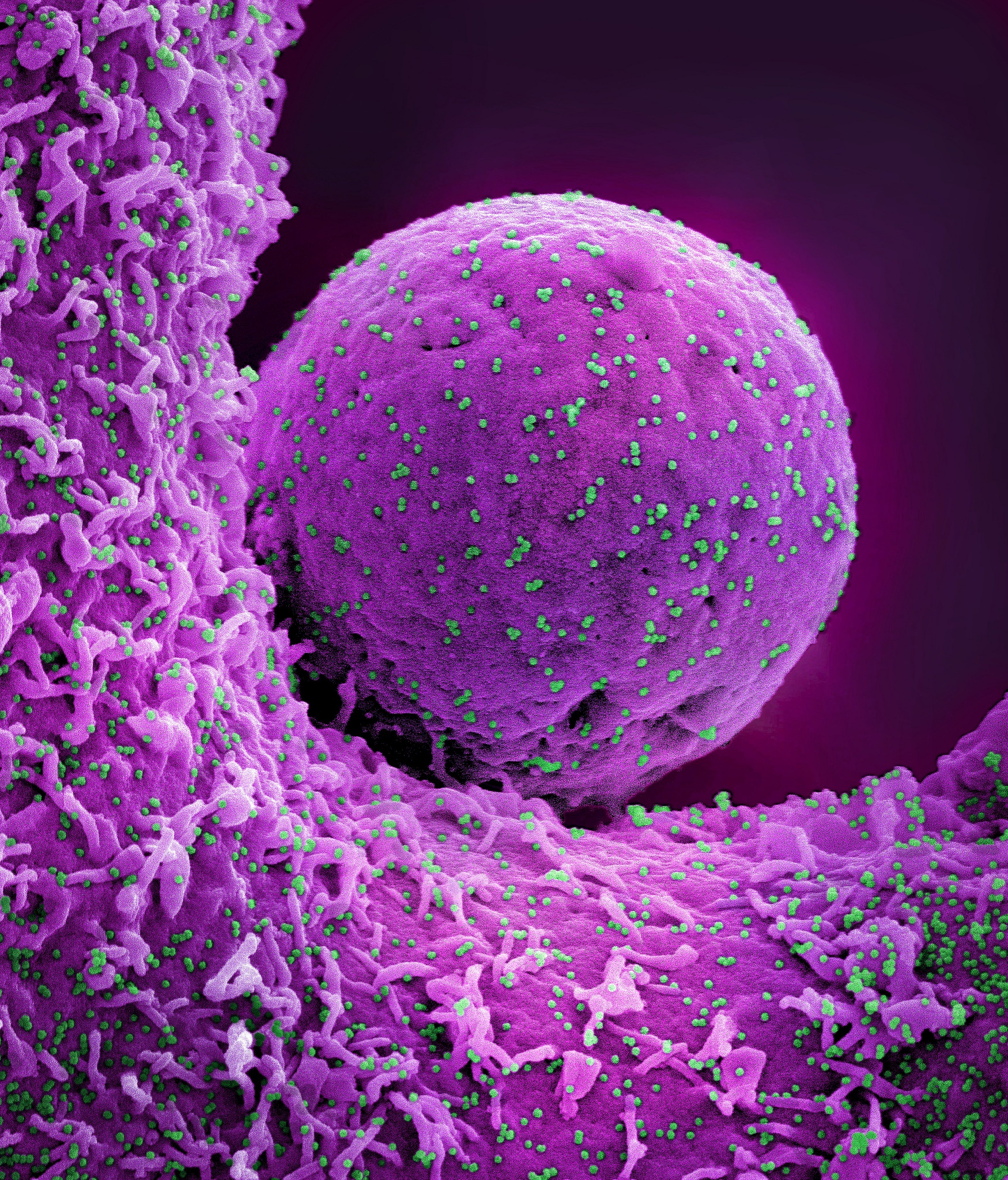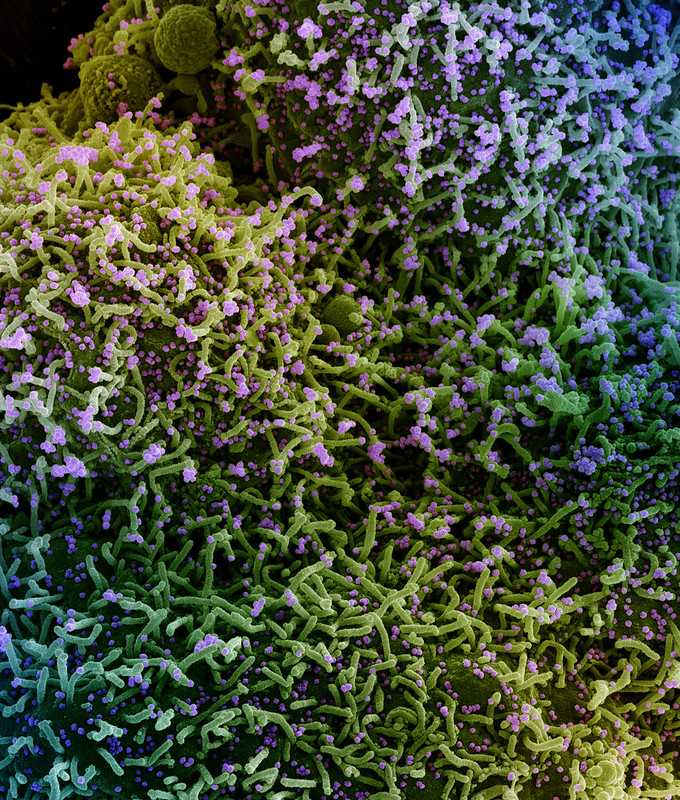Building on many years of previous research on SARS, MERS, and other related viruses, NIAID scientists and collaborators were well-positioned to rapidly develop and advance clinical trials of COVID-19 vaccines, eventually enabling the authorization and widespread use of multiple vaccines in the United States and around the world. View the timeline Decades in the Making: mRNA COVID-19 Vaccines.
Clinical Trials of COVID-19 Vaccines
Less than 3 months after SARS-CoV-2 was identified, NIAID initiated a Phase 1 clinical trial of the COVID-19 vaccine known as mRNA-1273. The trial was led by and enrolled participants at NIAID’s long-established Vaccine and Treatment Evaluation Units (VTEUs), part of the Infectious Diseases Clinical Research Consortium (IDCRC). The trial provided important safety and immunogenicity data enabling the advanced clinical development of the vaccine.
NIAID experts also played an integral role in the federal partnership among various components of HHS and the Department of Defense to coordinate the development, clinical trials, manufacturing, and distribution of COVID-19 vaccines. This effort was previously known as Operation Warp Speed and is now referred to as the Countermeasures Acceleration Group (CAG). A central aim of the effort was to produce and deliver enough vaccine doses sufficient to immunize the American public and to do this rapidly while continuing to adhere to the highest standards for vaccine safety and efficacy. Rather than eliminate steps from the traditional vaccine development timeline, the partnership ensured that complex processes occurred simultaneously, such as initiating large-scale manufacturing while clinical trials were still underway.
NIAID experts and federal partners collaborated with pharmaceutical companies to design, fund and conduct large-scale Phase 3 clinical trials of various COVID-19 vaccine candidates. As part of this effort, NIAID established the COVID-19 Prevention Network (CoVPN) by merging and expanding on multiple existing NIAID-funded clinical trials networks. CoVPN sites have participated in various manufacturer-led Phase 3 vaccine clinical trials and additional clinical studies. The federally funded and organized Phase 3 COVID-19 vaccine trials also shared a common Data and Safety Monitoring Board (DSMB)—formed by NIAID—which is an independent body that oversees study scientific rigor and volunteer safety.
In support of the harmonized reporting of immune results from Phase 3 COVID-19 clinical trials, the VRC worked closely with the FDA to validate immune assays that are used to measure and characterize responses elicited by COVID-19 vaccination.
NIAID, through the IDCRC, has led additional trials of COVID-19 vaccines, including research evaluating the safety and immunogenicity of mixed boosted regimens, variant-specific vaccines and second-generation COVID-19 vaccines.
COVID-19 Prevention Network (CoVPN)
NIAID established the COVID-19 Prevention Network (CoVPN) to enroll thousands of volunteers in large-scale clinical trials testing a variety of investigational vaccines and monoclonal antibodies intended to protect people from COVID-19. The CoVPN merges four existing NIAID-funded clinical trials networks: the HIV Vaccine Trials Network (HVTN), the HIV Prevention Trials Network (HPTN), the Infectious Diseases Clinical Research Consortium (IDCRC), and the Advancing Clinical Therapeutics Globally for HIV/AIDS and Other Infections (ACTG).
The CoVPN has participated in pivotal clinical trials of Spikevax (also known as mRNA-1273, developed by NIH and Moderna), the Janssen COVID-19 Vaccine (also known as the Johnson & Johnson vaccine or Ad.26.COV2.S), Vaxzevria (also known as AZD1222, developed by AstraZeneca), NVX-CoV2373 (developed by Novavax), and the Sanofi-GSK COVID-19 vaccine. The CoVPN has also evaluated monoclonal antibodies for prevention of COVID-19, including LY-CoV555 (discovered by AbCellera Biologics, in collaboration with NIAID’s Vaccine Research Center, and subsequently developed and manufactured by Lilly), and Regeneron’s REGEN-COV antibody cocktail. The CoVPN also has initiated COVID-19 surveillance research.
NIAID Collaboration with Moderna
Prior to the COVID-19 pandemic, scientists at NIAID’s Vaccine Research Center and the biotechnology company Moderna had collaborated for four years on mRNA vaccines for other emerging infectious diseases. In January 2020, as reports of the serious nature of SARS-CoV-2, the virus that causes COVID-19, began to emerge, NIH and Moderna agreed to collaborate and jointly develop a COVID-19 vaccine. The result was the COVID-19 vaccine now known as mRNA-1273 or Spikevax. By mid-March 2020, NIAID had begun enrollment in a Phase 1 clinical trial of the investigational vaccine. NIH’s collaboration with Moderna on the development of coronavirus vaccines is described in peer-reviewed scientific literature.
Vaccine Research in Special Populations
People who are immunocompromised or highly allergic
NIAID is conducting studies in people whose immune systems have had a suboptimal response to COVID-19 vaccination. This includes research evaluating the immune response to vaccination in people with primary or secondary immune system disorders as well as the effect of booster shots in transplant recipients and people with autoimmune disease on immunosuppressive therapies.
NIAID is also studying whether highly allergic people have higher rates of allergic reactions to mRNA SARS-CoV-2 vaccines and the nature of their reactions. NIAID is also leading a trial at the NIH Clinical Center in which participants who had an allergic reaction to a first dose of COVID-19 mRNA vaccine receive a second dose of vaccine under carefully controlled conditions.
Pregnant and postpartum people
NIAID-supported researchers are working to better understand the immune response generated by pregnant and postpartum people who have received COVID-19 vaccines as well as the transfer of vaccine-induced antibodies to infants across the placenta and through breast milk. Read more about the MOMI-Vax study.
Children
NIAID, through the CoVPN, is collaborating with Moderna to evaluate Spikevax (mRNA-1273) in children ages 6 months through 12 years. Read more about the KidCove study. The CoVPN is also enrolling adolescents in a trial evaluating NVX-CoV2373 developed by Novavax.
Universal/Pan-Coronavirus Vaccines and Next-Generation COVID-19 Vaccine Research
NIAID laboratories and NIAID-supported scientists across the country are working to develop “pan-coronavirus” or universal coronavirus vaccines, which aim to protect against multiple types of coronaviruses and viral variants. NIAID is funding multidisciplinary teams to conduct research focused on incorporating understanding of coronavirus virology and immunology, immunogen design, and innovative vaccine and adjuvant platforms and technologies to discover, design, and develop pan-coronavirus vaccine candidates that provide broad protective immunity to multiple coronavirus strains.
NIAID Adjuvant Development Program
NIAID’s Adjuvant Development program aims to advance novel vaccine adjuvants toward licensure for human use. The program supports the optimization of adjuvant candidates, vaccine formulation and preclinical adjuvant pharmacology, toxicity, and efficacy studies.
COVAXIN is an efficacious COVID-19 vaccine developed by Bharat Biotech in collaboration with the Indian Council of Medical Research ‒ National Institute of Virology. The adjuvant used in COVAXIN, Alhydroxiquim-II, was discovered and tested in the laboratory by the biotech company ViroVax LLC of Lawrence, Kansas with support exclusively from the NIAID Adjuvant Development Program. Read more about the NIAID Adjuvant Development Program.
Scientific Advances
NIH-Sponsored Trial of Nasal COVID-19 Vaccine Opens
July 1, 2024A Phase 1 trial testing the safety of an experimental nasal vaccine that may provide enhanced breadth of protection against emerging variants of SARS-CoV-2, the virus that causes COVID-19, is now enrolling healthy adults at three sites in the United States.

COVID-19 Vaccination and Boosting During Pregnancy Protects Infants for Six Months
February 14, 2024Women who receive an mRNA-based COVID-19 vaccination or booster during pregnancy can provide their infants with strong protection against symptomatic COVID-19 infection for at least six months after birth. These findings reinforce the importance of receiving both a COVID-19 vaccine and booster during pregnancy to ensure that infants are born with robust protection that lasts until they are old…

Study Reveals How Young Children’s Immune Systems Tame SARS-CoV-2
October 13, 2023A study of infants and young children found those who acquired SARS-CoV-2 had a strong, sustained antibody response to the virus and high levels of inflammatory proteins in the nose but not in the blood. This immune response contrasts with that typically seen in adults with SARS-CoV-2 infection.

NIH Scientists Urge Pursuit of Universal Coronavirus Vaccine
December 16, 2021A growing body of scientific evidence, considered together with ecological reality, strongly suggests that novel coronaviruses will continue to infect bats and other animal reservoirs and potentially emerge to pose a pandemic threat to humans. To counter future coronavirus outbreaks the global research community should focus on characterizing the range of coronavirus genetic diversity in multiple…

NIAID Issues New Awards to Fund “Pan-Coronavirus” Vaccines
September 28, 2021The National Institute of Allergy and Infectious Diseases (NIAID), part of the National Institutes of Health, has awarded approximately $36.3 million to three academic institutions to conduct research to develop vaccines to protect against multiple types of coronaviruses and viral variants. The awards are intended to fuel vaccine research for a diverse family of coronaviruses, with a primary…


